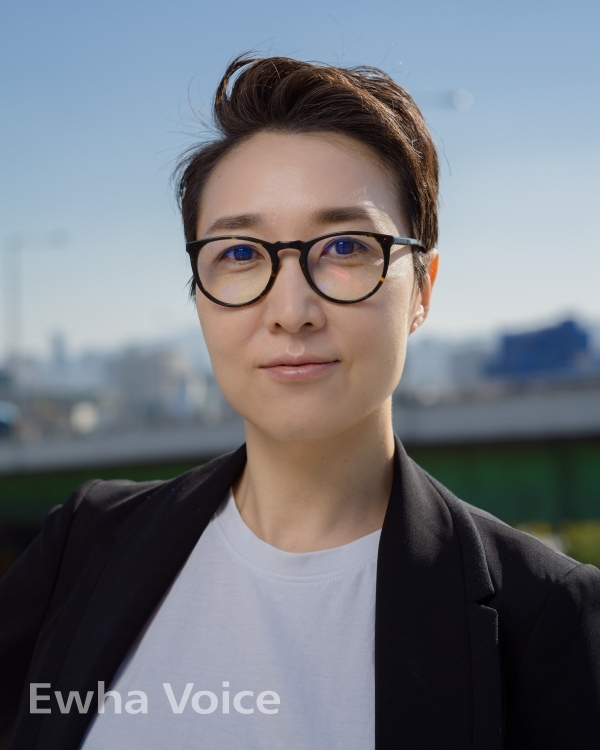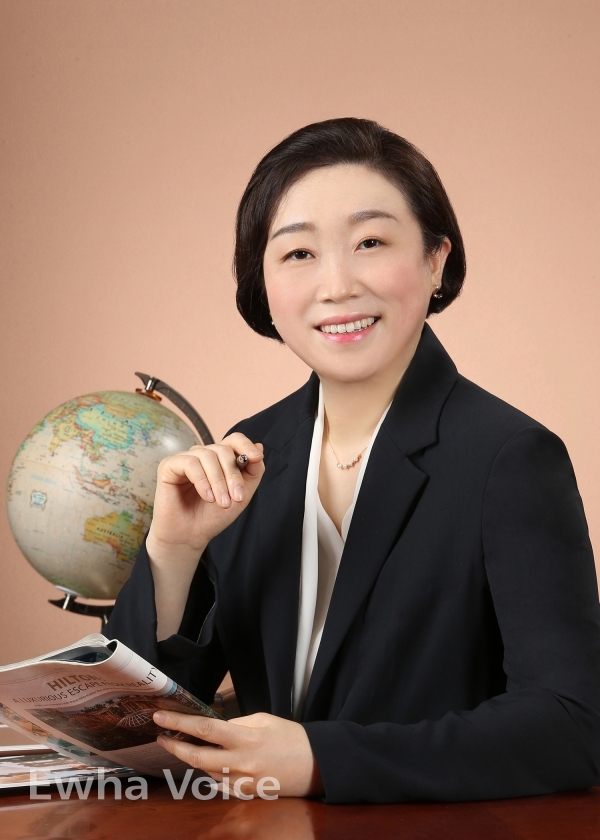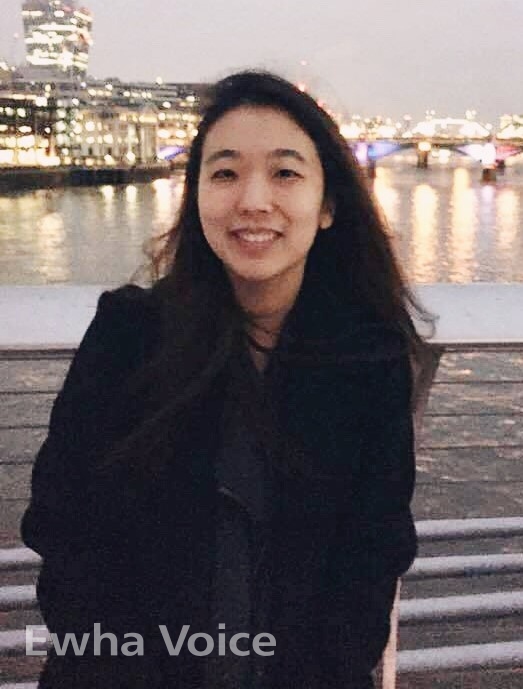By Lee Hyun-jin, Han Jun-hee, Park So-hyun, Choi Hyeon-ji
The United States Soccer Federation and its men’s and women’s national teams recently concluded a six-year fight over equal pay resulting in the women’s team receiving equal pay for game appearances and tournament victories to what the men’s team receives. However, the status quo of equal pay in Korea seems to be starkly different. According to Organisation for Economic Cooperation and Development (OECD) statistics, Korea has had the largest gender pay gap among developed nations since 1992. Ewha Voice interviewed three figures fighting for women’s rights on their thoughts and solutions regarding equal pay.
Equal pay from the lens of a feminist author

Kim Jin-ah is a writer and CEO of a feminist space called Woolf Social Club. Once an advertisement copywriter, she opened her eyes to feminism with the 2016 misogynistic murder incident at Gangnam Station in South Korea.
Kim attributes Korea’s big gender wage gap to the Korean society’s will to sustain its male-centered, patriarchal system.
“Among the many OECD member countries, Korea falls relatively short in awareness of gender equality. Our society still expects the identities of women to be subjugated to those of men,” she explained. “The environment is made so that women have no choice but to conform to the traditional custom of getting married and living life as a full-time wife.”
Kim reported that she is one of the countless women to have faced gender discrimination in employment.
“At my former job, I was discriminated against at the moment I was about to receive an important promotion,” she explained. “A man with significantly lower work skills than me was promoted instead. I was told that I should look out for the next opportunity since the man was older than me and had children to feed.”
As a person who puts her heart into her work and has achieved so much, her pride did not allow her to remain in that position. Instead, she resigned from the company the next day, but she expressed her situation as “being resigned”. Till this day, she questions whether the resignation was her choice and expressed bitterness about the fact that women are currently resigning without even knowing that they are the ones “being resigned.”
Kim’s book “I’m Here to Save My Pie, Not to Save Humanity” perfectly depicts the unleveled playing field in our society.
“This is a book that I wrote when I yearned for self-introspection after going through divorce and a career break,” she said. “It is about a woman’s dignity as an independent self without being subordinated to any external force. I wanted to talk about the things we need to realize but we do not yet have.”
Kim asked herself what it takes for a woman to bring back her stolen pie from men and what it takes for a woman to survive without being cut out from society. Her answer was to form a women's social club with ambitious women and develop it into a political force. Kim says that once we understand that feminism is a fight for our pie, it is easy to see what will help bring it back.
She believes that just as the definition of "female" does not differ from person to person, the definition of "feminism" does not either. If the feminism that people think of differs, that should be considered individualism. From the start of the feminist movement, feminism was a declaration of equal rights for women who still face gender discrimination and violence. The goal of modern feminism is to achieve equal employment, equal pay, an equal number of executives, and an equal number of seats.
For Korean university students to combat gender discrimination, Kim states that personal capability and legal and institutional changes must be administered simultaneously. Without legal and institutional support for women, no matter how individually capable the woman is, she will be blocked by the wall of gender discrimination.
“Just as it takes a village to raise a child, women as a whole must work together to overcome gender discrimination,” Kim said. “The first step is to realize this reality.”
Woolf Social Club is a café located in Hannam-dong named after Virginia Woolf. The concept of the club was Woolf’s “A Room of One’s Own,” as though 90 years has passed since the book was published, women still fight for economic and mental freedom. The club offers a safe environment for women to connect with similar people and gain the strength to continue fighting.
Recently, Kim’s second book has released its Japanese version with a title that reflects Japan’s growing interest in feminism. She wishes to introduce her book to other countries and share the stories of Korean women to women worldwide.
“I would like to discuss issues universally experienced by women across different nationalities,” she said. “It is also necessary to popularize Korean feminism to reveal difficulties and ways to overcome them.”
Equal pay from the perspective of law
Ewha Voice extended the discussion about equal pay with two experts working in the field of law, lawyer Eunhee Sophia Kang and Professor Park Kwi-Cheon. Kang is a lawyer working at the GongGam Human Rights Law Foundation, while Professor Park specializes in labor law and currently works to foster future legal professions at Ewha Law School.


Park: There are mainly two reasons behind the problem. First is the wage gap caused by discrimination. In the case of large enterprises, wage gaps mainly occur as women tend to be excluded from workplaces or are not given enough opportunities. In small and medium-sized enterprises, direct wage discrimination usually occurs due to the absence of an official human resources system or systems that guarantee work-family balance. Second, women usually being concentrated in low-wage businesses is also a reason. Since the economic crisis in the late 1990s, when the wage gap according to the company’s size increased, more women started to work at small and medium-sized enterprises than men. In addition, the separation of business based on gender, which refers to men and women having different types of careers, has been rapidly intensifying since 2008.
Kang: According to Article 8, Clause 1 of the act, it is mentioned “The employer shall provide equal pay for equal-value work within the identical business.” Wage discrimination is recognized once the employer fails to provide a logical reason. However, wage-related information is not disclosed in many workplaces, and therefore, it is difficult for employees to claim the existence of a gender wage gap.
Kang: There are in fact several laws that prohibit discrimination based on employment types without justifiable reason such as the Act on the Protection of Fixed-Term and Part-Time Employees and the Act on the Protection of Temporary Agency Workers. However, in reality, it is very difficult for temporary workers to prove that unfair treatment was exacted upon them. To judge whether discriminatory treatment has been going on, there must be another group of people to compare the situation to. In the case of temporary employees, that group would be the full-time employees working in the equivalent workplace. However, the majority of the time, the workplace of a temporary worker and full-time worker are different, hence making it hard to compare and assess acts of discrimination.
Park: A critical flaw when proving a discriminatory action is that the decisive evidences, such as the specific data on wages, are usually in the hands of the employers. In countries like Germany and the UK, employees are legally guaranteed the right to know how much other employees of the opposite gender working for an equal value are getting paid. I believe that Korea should guarantee such rights as well and additionally set a more precise criteria for judging whether the value of a work is equal to that of another.
Park: First and foremost, women themselves must be aware of the issue and discuss it openly with others. Moreover, actively interact with other men and gain their support so that we can all work together to resolve gender inequality.

